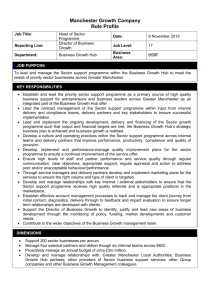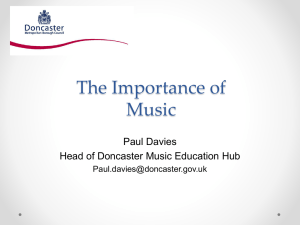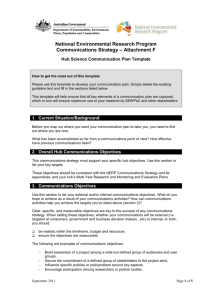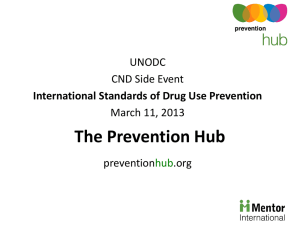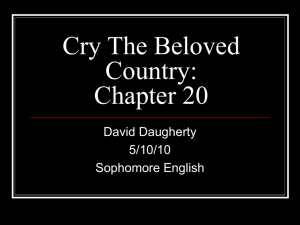File - Shakespeare4alltime
advertisement
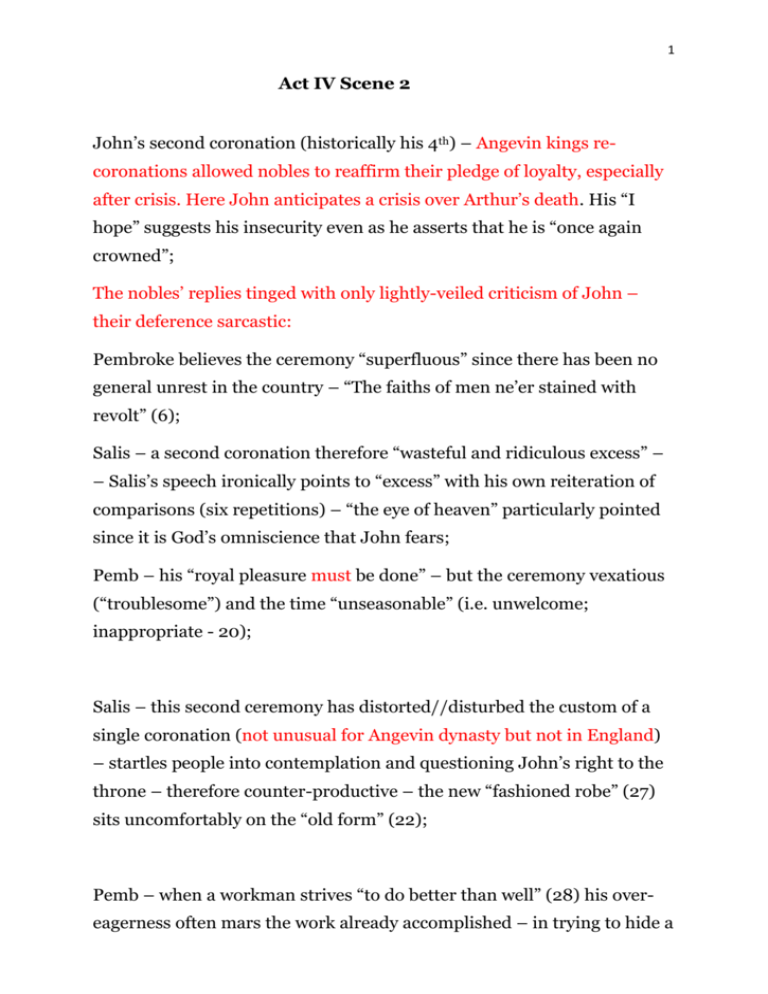
1 Act IV Scene 2 John’s second coronation (historically his 4th) – Angevin kings recoronations allowed nobles to reaffirm their pledge of loyalty, especially after crisis. Here John anticipates a crisis over Arthur’s death. His “I hope” suggests his insecurity even as he asserts that he is “once again crowned”; The nobles’ replies tinged with only lightly-veiled criticism of John – their deference sarcastic: Pembroke believes the ceremony “superfluous” since there has been no general unrest in the country – “The faiths of men ne’er stained with revolt” (6); Salis – a second coronation therefore “wasteful and ridiculous excess” – – Salis’s speech ironically points to “excess” with his own reiteration of comparisons (six repetitions) – “the eye of heaven” particularly pointed since it is God’s omniscience that John fears; Pemb – his “royal pleasure must be done” – but the ceremony vexatious (“troublesome”) and the time “unseasonable” (i.e. unwelcome; inappropriate - 20); Salis – this second ceremony has distorted//disturbed the custom of a single coronation (not unusual for Angevin dynasty but not in England) – startles people into contemplation and questioning John’s right to the throne – therefore counter-productive – the new “fashioned robe” (27) sits uncomfortably on the “old form” (22); Pemb – when a workman strives “to do better than well” (28) his overeagerness often mars the work already accomplished – in trying to hide a 2 “fault” with a “patch” (continuing the ‘robe’ image) we may succeed only in exposing the fault to additional scrutiny [N.B. “fault” used four times]; Salis points out that before this second coronation the barons had given him their advice (“counsel”) but he had over-ruled it and therefore they are content since their wishes go no further than the king’s royal will allows – though “make a stand” clearly implies an element of resistance. John tried to be assertive – he had previously explained his reasons for the second coronation – he will give them even stronger reasons for his decision when his fears are less (i.e. when he no longer fears losing his throne to Arthur). In the meantime, if they will tell him what they believe is “not well” (44) he will willingly “grant you your requests”; Pemb – speaking on behalf of others – claims that their concerns are chiefly for “your safety” – in pursuit of which they urge “Th’enfranchisement of Arthur” whose imprisonment has prompted discontented murmuring among the people and may lead them to the dangerous question (i.e. “dangerous argument”) of why you should fear anything; fear, as people say, only haunts those who are in the wrong and since if you hold lawfully what at present you possess in peace (i.e. the crown) why lock up (“mew” = confine; coop up) Arthur (“tender kinsman”) and deny him the upbringing appropriate for a prince. So that discontented people who are opposed to the present state of affairs shall not have a pretext for attack we request – not for our own advantage – but since our own wellbeing (“weal”) depends on your welfare then release Arthur (N.B. the notion of the ‘commonweal’ depending on the reciprocal, symbiotic relationship of king and people); When John sees Hub enter – believing Arthur to be dead – he ‘complies’ with their request. 3 While Hub whispers to John the barons speak of Hub’s role in Arthur’s murder – Hub had shown the king’s “warrant” for the murder to “a friend of mine” [unlikely – but some explanation is needed of the barons’ sarcasm at the beginning of the scene] and note how Hub’s demeanour [and his physical ugliness is stressed later in the scene – N.B. Constance’s words on ugliness to Arthur] and furtive look (“close aspect”) betray his guilty conscience (“troubled breast”). They fear that the deed is done. Salis notes how the king’s complexion changes, prompted by the conflict between his evil design and his guilty conscience; the revelation of John’s crime compared to a boil that is on the point of bursting (“needs but break” - 79). Pemb completes the metaphor, remarking on the “foul corruption” (i.e. pus) of an innocent child’s death that will “issue thence” when the boil does break. John comes forward: although he was willing to grant the barons’ request their suit is (unfortunately) hopeless and without effect – Hub has brought news that Arthur died last night [OED ‘tonight’ quotes R&J: “I dreamt a dream tonight”]; Barons’ sarcasm – the idea of Arthur being near death “Before the child himself felt he was sick” virtually an open accusation and the threat of “This must be answered” – i.e. there will be consequences – the surface gloss of pretended courtesy is cast aside; John attempts to brazen it out – why scowl at him – he doesn’t possess the “shears of destiny” that determine the end of life [i.e. The one of the three Fates who cuts off life – Atropos] – he doesn’t have command over how long life lasts; Salis speaks of obvious “foul play” – it is shameful that “greatness” (i.e. a man in authority) should make such a clumsy attempt to gloss over a crime; may you suffer the consequences accordingly and as you have 4 played foul in this affair may you fare the worse in your other intrigues (i.e. as is deserved by someone who cheats when playing a “game” - 95); Pemb will go with Salis and find out Arthur’s “forced grave” – i.e. a grave brought about violently rather than at the end of a natural life’s span – this grave is Arthur’s “inheritance” – his “little kingdom” – the “blood” – i.e. legitimate inheritance of the whole of “this isle” is reduced to the “three feet” he ‘inherits’ in his grave. The times (“the while”) are rotten//corrupted (returns to the image of the boil) – such injustice must not be endured and will “break out” – suggestion of civil unrest//revolution in which they will all suffer the consequences. [Exeunt] Seeing the bitterness of the barons John “repent(s)” (103) – realises that there can be no security (“sure foundation”) based on bloody violence [This fulfils Pandulph’s prediction at III.4.147-48: “For he that steeps his safety on true blood, // Shall but find bloody safety, and untrue”] Messenger John senses bad news from Mess’s complexion – blood drained from cheeks – storm imagery counters the earlier sun imagery; France has recruited a greater army than was ever before levied for any foreign invasion – their speed the model of John’s own invasion of France learned from John’s example – they are already arrived in England; John wonders at lack of “intelligence” to anticipate this – how could his mother’s “care” be so neglectful as to be ignorant of such an army; Mess. – her ear “stopped with dust” – died 1st April [N.B. John’s stunned response – this is first scene in which John has appeared without her]; Constance “in a frenzy died” (122) three days previously [Constance’s death not in TR – Holinshed has Queen Eleanor’s death in 1204 but does 5 not mention Constance who in fact died in 1201 before the death of Arthur (probably died 1203] – uncertainty of “rumour’s tongue” – the lack of certainty in the news parallels the increasing instability of John’s position; John pleads with ugly (“dreadful”) Opportunity to “Withhold thy speed” – not to pass him by until he has appeased “my discontented peers” – if his mother is dead then his French possessions will be in a state of confusion (“wildly” - 128) – learns that the Dauphin (Lewis) has command of the French army. [N.B. in III.4.119-20 Pandulph had encouraged Lewis with the thought that “when Fortune means to men most good,// She looks upon them with a threat’ning eye” – i.e. John, being at the summit of his good fortune must inevitable fall]. Enter Bastard & Peter (of Pomfret) [Holinshed mentions Pater, a hermit, but Shakespeare adds ‘of Pomfret’ (i.e. Pontefract) because Richard II was murdered in Pomfret castle as were barons opposed to Richard III] John is “giddy // With these ill tidings” and hopes for some good news from Bastard since his head is “too full” of “ill news” – Bast responds sharply and revives John’s spirits momentarily so that he is able to “breathe again” (138), his head “Aloft the flood”; Bast’s success “among the clergymen” can be measured by the amount of money he has gathered from them – BUT as he travelled he found the people full of unusual fancies, “full of idle dreams” but not knowing why. He produces Peter as a “prophet” whose prophecies attracted “many hundreds” of listeners and prophesying that before Ascension Day at noon John shall “deliver up your crown”.1 Ascension Day – festival commemorating Christ’s bodily ascension into heaven (40th day of Easter – usually a Thursday). 1 6 John addresses Peter as “Thou idle (foolish) dreamer” – Peter assures John that “the truth will fall out so” (154) [N.B. Remember Julius Caesar to the Soothsayer: “He is a dreamer; let us leave him – pass” (JC, I.2) – Hubert instructed imprison (“in safety”) Peter and hang him on that day at noon. Hub to return – “For I must use thee” (159) Exit Hub & Peter. Bast confirms that the French have landed – he had met Lord Bigot and Salisbury – enraged – who, with others, were looking for the grave of Arthur, killed the previous night at John’s incitement. John: Bast to bring them to the court: “I have a way to win their loves again” (169) – [this plan is never revealed – BUT could this be Magna Carta…?]; John urges Bast to “make haste” – desperately hopes that he will have “no subject enemies” when there is a foreign army in the land. Bast’s “spirit of the time” = Occasion will give him extra urgency and therefore speed; John’s own spirit revived by Bast’s demeanour – messenger to carry messages from Bast. “betwixt me and the peers” (179) – but briefly left alone the impact of his mother’s death again apparent: “My mother dead!” Enter Hubert. Hub brings further news that affirms Pandulph’s words to Lewis (III.4.153-59) about natural phenomena being taken by the people as “meteors prodigies and signs … Plainly denouncing vengeance upon John”: “they say” - 5 moons – 4 fixed and one that did “whirl about” (179) – clearly linked to “Young Arthur’s death” – graphic description (188-202) of individual common people gripped by rumour and speculation – close detail creates convincing verisimilitude: cooling irons – tailor’s slippers on wrong feet; 7 John’s anxiety returns – begins to disassociate from Arthur’s death and pass responsibility to Hubert: “Why seek’st thou … Why urgest thou so oft … Thy hand hath murdered him” – John had “a mighty cause // To wish him dead” – but Hub had “no cause” to murder him” [N.B. R2 – “Though I did wish him dead, // I hate the murderer, love him murderèd” (V.6.39-40)] – [Again John guilty of equivocation: “I wish …” a slippery expression – could imply command OR a simple desire with no suggestion of resultant action] To Hub’s “did you not provoke me?” – John again shift responsibility: Hub one of the “slaves” who mis-interpret the moods (“humours”) of a king as a command (“warrant”) – to take a king’s slightest hint (“winking”) as the authority for murder, taking it upon themselves to understand the intentions of an angry king when his state of mind is due more to a passing whim than to deliberate consideration (i.e. line 214); Hub produces John’s warrant and (presumably) the king’s own seal – John parries with the observation that come the Day of Judgement the “hand(writing) and seal // Witness against us to damnation” – unclear whether the ‘us’ is the royal plural or whether it implies equally shared guilt….? Probably the former as John essentially self-centred throughout the scene. [N.B. When Macbeth ponders the consequences of murdering King Duncan he argues that if he could be sure that there would be no consequences “in this life” then he would be prepared to “jump (i.e. risk/take a chance) the life to come”]; John reflects on how often our perception of an opportunity to commit sin causes us to sin (219-20) – he blames Hub’s physical deformity//disfigurement (“by the hand of nature marked” – N.B. ‘the mark of Cain’ Genesis – the mark not specified but placed on Cain by God as a sign that he is not to be killed for having killed his brother, Abel) for singling him out as a man likely to commit a crime – and therefore tempting John to succumb (“this murder had not come into my 8 mind”) [N.B. “Quoted and signed …”2 is the equivalent of the handwriting and seal on the warrant that authorised the murder – i.e. Hub’s physical ugliness provides its own ‘authorisation’.]. He makes this ‘accusation’ three times in all, concluding that he merely hinted (“faintly broke”) at Arthur’s death and Hub – to win the king’s favour – had no qualms of conscience about murdering a prince; Hub’s attempt at response brushed aside: if Hub had merely shaken his head or even hesitated (“made a pause”) or cast a look of doubt as if to ask the king to put unmistakably into words his meaning THEN John would have been overwhelmed by shame and broken off any such suggestion – BUT Hub had interpreted John’s “signs” and responded with his own “signs” – i.e. neither had spoken his meaning directly – accepting the suggestion without hesitation (“without stop” - 239); consequently Hub’s “rude (rough/savage) hand” had committed the deed that both of them regarded as being vile (wicked/horrible) to speak aloud. [Dr Johnson regarded these lines as being ‘not the words of art or policy, but the eruptions of a mind swelling with the consciousness of a crime, and desirous of discharging its misery on another’]. John commands Hub “out of my sight” (242) – Hub’s very presence is a persistent rebuke to John. John laments his present difficulties: nobles “leave me” – his government challenged and defied (“braved”) – he imagines his kingdom as a city (like Angers) with an invading army at the gates – the chaos in the state is reflected by chaos in the king’s own physical body (the body as microcosm) in his own internal civil war between his conscience and “my cousin’s death” (i.e. his crime); 2 OED Sign v: I. To use or affix a mark or signature, and senses relating to and deriving from this. 1. trans. a. To put a seal upon (a letter or document) as a means of identification or authentication; to stamp with a seal or signet; to cover with a seal. Also fig. and intr. Now only in to sign with a seal (or signet) and similar phrases. 9 Hub can do nothing about the nation’s enemies, urging him to “arm yourself” BUT he can reconcile the king’s conscience since Arthur “is alive” – Hub goes on purge himself of his supposed guilt for Arthur’s murder: his hand “a maiden … innocent” – in his heart (“bosom”) he never entertained any impulse (“motion”) towards a murderous thought; Hub rebukes John or having “slandered” his nature, accusing him of inhumanity in abusing his physical appearance which, whatever its external imperfections (howsoever rude exteriorly”), nevertheless contains a “fairer mind // Than to be the butcher of an innocent child”; John’s delight immediately turns to the political advantage that Arthur’s being alive will bring him, paying little heed to Arthur’s own survival – Hub whom he has so shamefully slandered is now to be the vehicle by which the barons are to be made “tame” and brought to “obedience” (262); a cursory request for forgiveness for having slandered Hub’s “feature” – John merely blinded by misplaced “rage”, seeing Hub through bloodshot eyes that had distorted John’s perceptions of his physicality. Abruptly prevents Hub’s response (“O, answer not!”) – instructed to bring the “angry lords” to his private apartment with all speed – concludes the scene urging all speed.
